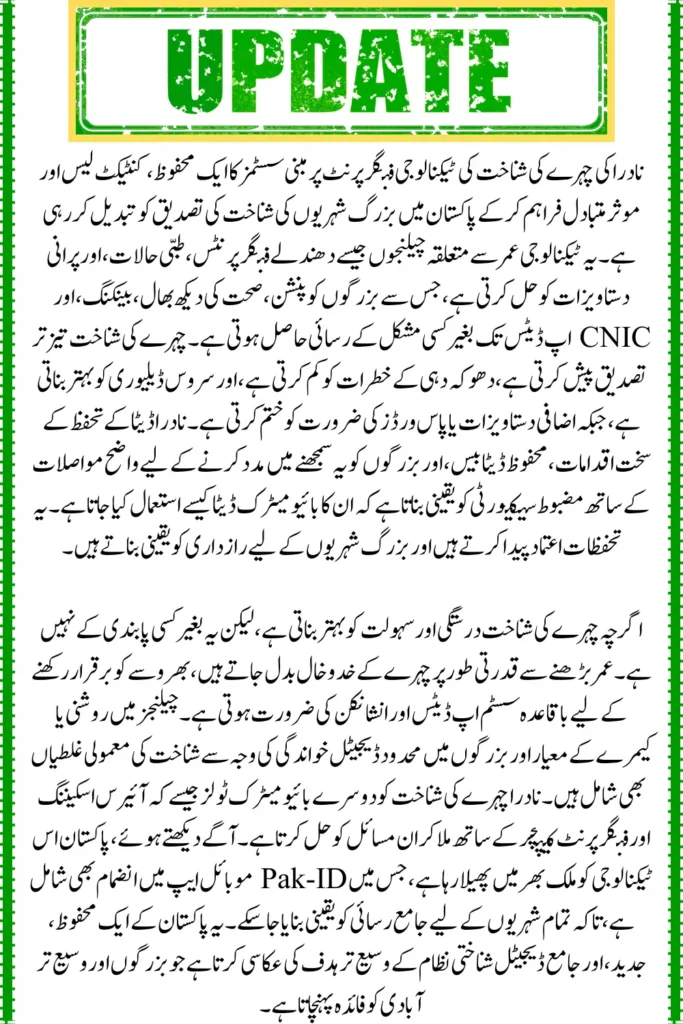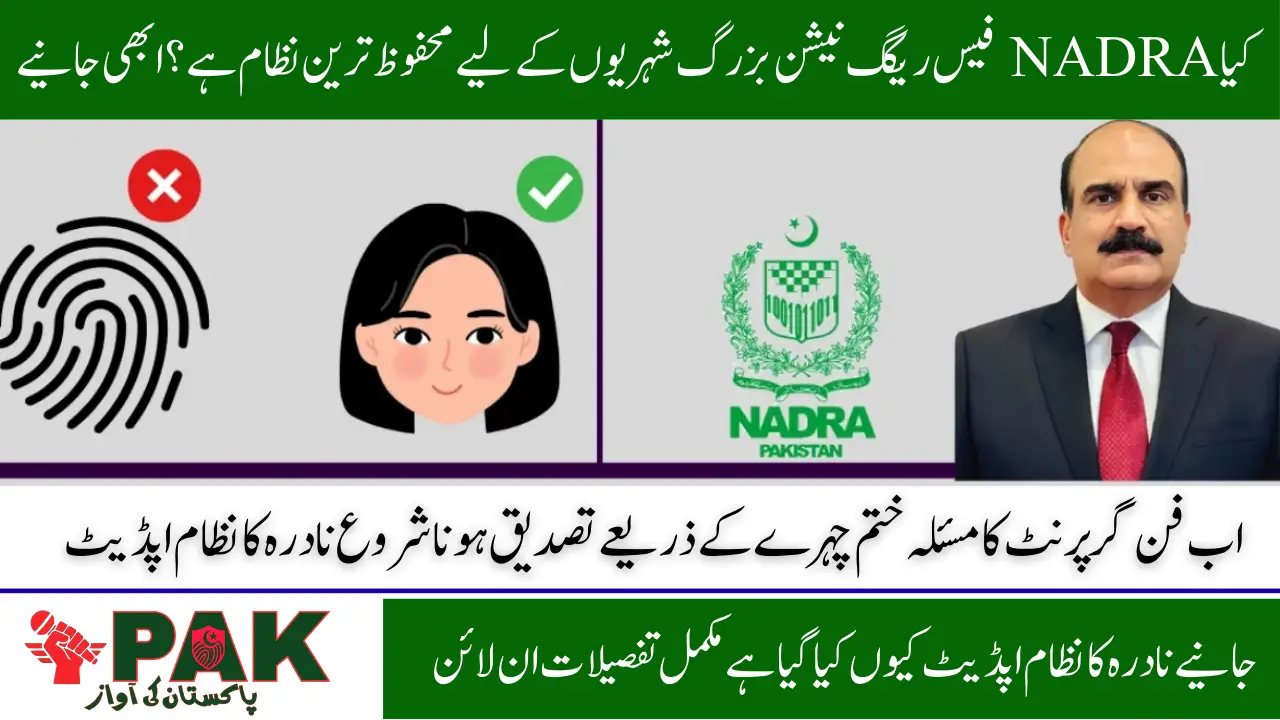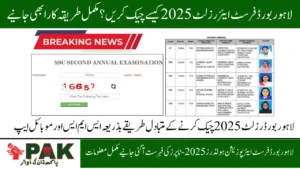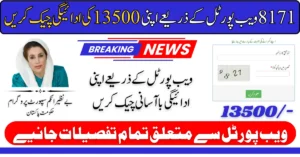NADRA Face Recognition Elderly Citizen Security
NADRA uses advanced face recognition technology to protect elderly citizens. This system helps verify identity quickly and ensures safe access to services. It reduces the risk of fraud and supports seniors in getting their rights without stress. Elderly citizens feel more secure with digital identity protection.

The face recognition system makes verification easy for elderly people. They do not need to remember passwords or carry extra documents. NADRA ensures safety, fast processing, and trust for seniors. With this technology, elderly citizens get reliable support and secure access anytime.
You Can Also Read: Punjab Board Releases 12th Class Supply Exam Schedule for 2025
Face Recognition Technology in NADRA
NADRA has introduced facial recognition technology in Pakistan to support elderly citizens who face difficulties with traditional verification methods, such as fingerprints and outdated documents. This system analyzes unique facial features to confirm identity quickly and securely. It helps senior citizens access essential services like pensions, healthcare, banking, and CNIC updates without the hassle of repeated fingerprint failures. Facial recognition is contactless, time-efficient, and reliable, making it a practical solution for elderly verification in Pakistan.
- Ensures smooth pension disbursement when fingerprints fail.
- Provides accurate identity checks in hospitals and clinics.
- Supports secure banking transactions for older account holders.
- Simplifies CNIC renewals and updates.
- Offers contactless and fast verification.
NADRA facial recognition gives elderly citizens in Pakistan an easier and more reliable way to verify their identity.
You Can Also Read: Punjab Boards Announce 10th Class Supplementary Exam Dates, Check Your Schedule Now
Security for Elderly Citizens
NADRA prioritizes the security of elderly citizens’ data when using facial recognition technology. Protecting sensitive biometric information is crucial to maintaining trust and ensuring safe access to essential services. The system is designed with strong safeguards to prevent misuse and unauthorized access. Transparency and awareness are key, helping seniors understand how their data is stored and used. This ensures that facial recognition not only improves verification but also protects the rights and privacy of elderly citizens.
- Strict protection of facial scan data against misuse.
- Secure databases to prevent unauthorized access.
- Clear communication to seniors about data use and safety.
- Regular system updates to strengthen data protection.
- Legal compliance with privacy regulations.
NADRA ensures elderly citizens’ privacy and safety with robust facial recognition security measures.
You Can Also Read: Punjab Free Electric Bike Scheme for Teachers, Who Can Enroll and Key Benefits
Accuracy and Limitations
Facial recognition technology in NADRA offers improved accuracy for elderly citizens compared to fingerprint-based verification. However, age-related changes such as wrinkles, skin tone variation, and facial structure shifts can affect recognition performance. To maintain accuracy, the system requires ongoing updates and technical calibration. While facial recognition is faster and more consistent for seniors, it is not without limitations. Careful management and adaptive technology are necessary to ensure reliable results for all elderly users.
- Facial features remain more consistent than fingerprints but still change with age.
- Regular system training is needed to adapt to appearance changes.
- Minor recognition errors can occur due to lighting or camera quality.
- Limited digital literacy among seniors may hinder smooth use.
- Backup verification methods remain essential in case of system failure.
NADRA facial recognition improves verification for elderly citizens but requires updates and safeguards to address age-related limitations.
You Can Also Read: Electric Buses in DG Khan, Outlay, Route Maps, and Voyage Insights
Privacy and Ethical Concerns
Facial recognition for elderly citizens raises important privacy and ethical issues that NADRA must address. Collecting and storing biometric data requires strong safeguards to prevent misuse or unauthorized access. Elderly citizens may not always fully understand how their data is used, making transparency and clear communication essential. Ethical concerns also include consent, data ownership, and preventing discrimination. By addressing these challenges, NADRA can ensure the system remains trustworthy and respectful of citizens’ rights.
- Ensure facial data is used only for authorized purposes.
- Maintain secure storage and prevent data breaches.
- Provide clear explanations to elderly citizens about data collection and usage.
- Obtain informed consent before data capture.
- Establish oversight to prevent misuse and discrimination.
Protecting privacy and addressing ethical concerns is essential for NADRA’s facial recognition system for elderly citizens.
You Can Also Read: NADRA Rolls Out Digital Services for Senior Citizens, and Entrance Made Simple
Future of Facial Recognition in Pakistan
Pakistan is rapidly advancing facial recognition technology to improve identity verification, especially for elderly citizens and underserved communities. NADRA leads this change by integrating facial recognition into its services, including the Pak-ID mobile app, to enhance accessibility and security. The technology is expanding nationwide, with plans to reach smaller towns and rural areas. NADRA’s focus is on combining facial recognition with other biometric tools for faster, safer, and more inclusive identity verification. This development aligns with Pakistan’s broader digital transformation goals, making services more efficient and citizen-friendly.
- Nationwide rollout of facial recognition in NADRA centers and the Pak-ID app.
- Integration of facial recognition with iris scanning, fingerprints, and signature capture.
- Expansion into smaller towns and rural areas for broader access.
- Enhanced digital security to prevent identity theft.
- Continuous upgrades for accuracy and efficiency.
Facial recognition will play a key role in Pakistan’s future digital identity systems, improving security and access for all citizens.
You Can Also Read: NADRA Biometric BISP Cash Payment, The Ultimate Walkthrough
Conclusion
NADRA’s adoption of facial recognition technology represents a major advancement in Pakistan’s identity verification system. For elderly citizens, this technology offers a practical solution to the challenges posed by fingerprint-based verification. It provides a contactless, fast, and reliable method for accessing essential services such as pensions, healthcare, banking, and CNIC updates. This approach improves convenience while reducing delays and errors that often affect senior citizens.
However, the success of this system depends on addressing privacy, security, and ethical concerns. Strong safeguards, clear communication, and regular system updates are essential to maintain accuracy and trust. By expanding facial recognition nationwide and integrating it with other biometric tools, Pakistan is building a more secure, efficient, and inclusive digital identity framework that benefits all citizens, especially the elderly.
You Can Also Read: NADRA Data Correction Online, Flawless Process, Time-Saving Results, and Endorsed Web Technique
Common Questions
How does NADRA’s facial recognition system work for elderly citizens?
It scans unique facial features such as the spacing of eyes, nose, and jawline to verify identity quickly and accurately, even when fingerprints are unreliable.
Is facial recognition safe for seniors in Pakistan?
Yes, NADRA uses secure databases and strict privacy measures to protect biometric data, ensuring it is used only for authorized purposes.
Can elderly citizens use facial recognition for all NADRA services?
Currently, it is available for pension verification, healthcare access, banking, and CNIC updates, with plans for wider implementation.
What are the limitations of facial recognition for the elderly?
Aging can change facial features, and poor lighting or camera quality can affect accuracy, so regular system updates are required.
How does NADRA address privacy concerns with facial recognition?
NADRA provides clear information, obtains consent, and ensures data is stored securely, with strong safeguards against misuse.
You Can Also Read: Government Ends One-Year Pension Policy, Implications for Your Post-Retirement Life









